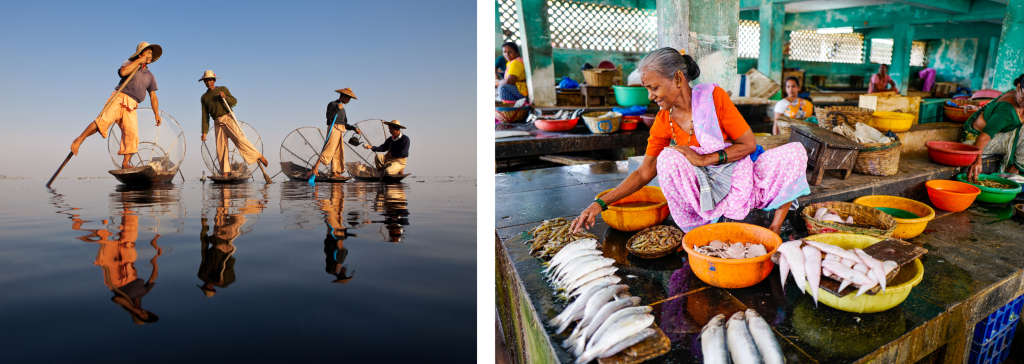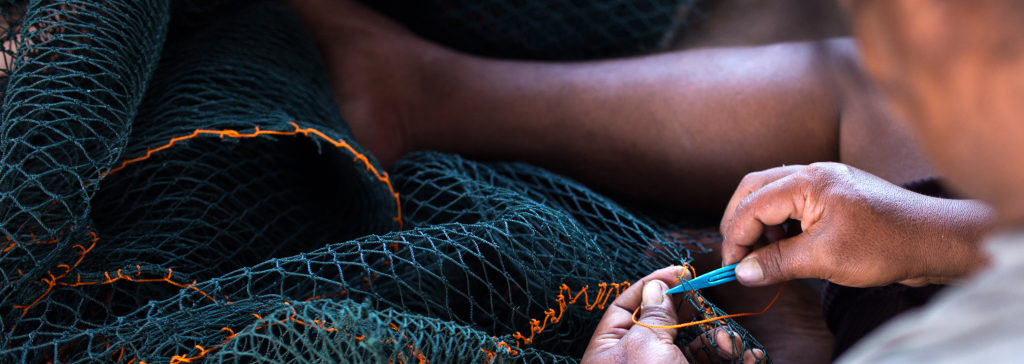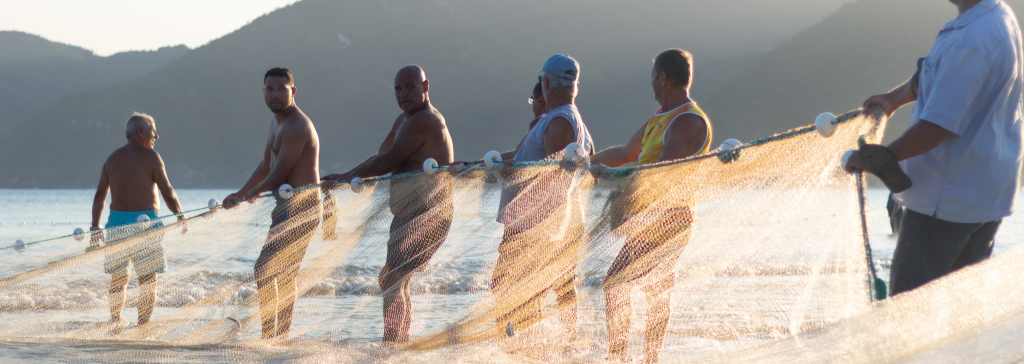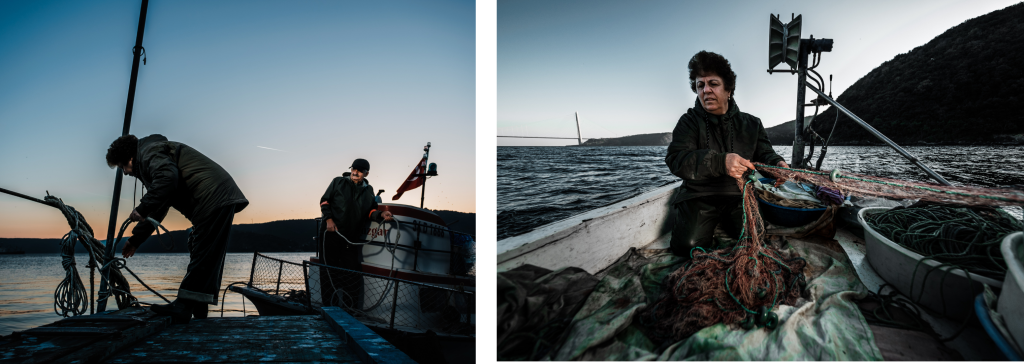Everything we know & love about the International Year of Artisanal Fisheries and Aquaculture
Did you know that 2022 is the International Year of Artisanal Fisheries and Aquaculture? This global movement is designed to shine a light on the enormous contributions made by small-scale fisherfolk, and aims to drive for policy change that meets their needs and prioritises their rights. But what is the importance of amplifying the voices of these communities? And vitally, what needs to change to secure their equitable management? Our Science & Policy Co-Manager, Elle, explores just this…

As a science and policy team, much of our work is centred on communicating academic knowledge. The research we support is exceptional – impactful, diverse, meaningful – and we’re incredibly proud to act as the interface between science and policy; but are the voices of science the only ones that we should be communicating?
The International Year of Artisanal Fisheries and Aquaculture (IYAFA) is a global movement working to turn the tide, and secure a platform for the voices of all those working in small-scale fisheries. Declared by the Food and Agriculture Organisation (FAO), the year ‘aims to focus world attention on the role that small-scale fisheries, fish farmers and fish workers play […] increasing global understanding and action to support them’. The year coincides with key policy moments and international conferences, with the potential to become a turning point in the fair representation of small-scale fisherfolk on the global policy stage.
Amplifying marginalised voices? Check. Driving for rights-based policy? Check. Reflecting our values through our work? Check. It sounded like more than a bit of Mindfully Wired… We had to get involved.
Why now?
In 2014, the FAO published the Small-Scale Fisheries Guidelines – a set of voluntary guidelines providing direction for governments on how best to support their small-scale fisheries and fishing communities. Produced following extensive collaborative research with more than 4000 small-scale fishing actors across 120 countries, the guidelines are widely regarded as being a stand-out example of going beyond the immediate economic drivers of fisheries, instead highlighting the rights and needs of the people behind them. While many states showed positive intent by committing to act against the guidelines, their voluntary basis means that the actual number of resulting policy actions remains low.
IYAFA seeks to build upon the SSF Guidelines, restating their importance and bringing the voices of small-scale fishers to the forefront in asking for policy change. It’s a bold move – governments have a lot on their plates, from building resilience to climate change, staring down a looming financial crisis , tackling gender inequality, and making sure that everyone’s got enough to eat. But dig beneath the surface and you may be surprised by how many of the world’s most pressing issues can be at least partially mitigated by providing adequate support for small-scale fisheries and aquaculture communities.

“Small in scale, big in value*”
Collectively, small-scale fisheries are responsible for more than 40% of all fish caught globally. This can be loosely translated as small-scale fisheries acting as a crucial source of protein for more than three billion people worldwide. The global population in 2022 was clocked at 8 billion people (ish), so in percentage terms artisanal fisheries and aquaculture are providing essential nutrients (Omega-3, zinc, selenium, protein) to a cool 37.5% of the global population.
Providing all that protein takes a lot of work, from catching or cultivating fish and seafood (harvest) to processing, preparing, selling, and cooking it (post-harvest). Small-scale fisheries provide employment for more than 492 million people worldwide, with one fishery often supporting an entire community.
With all those jobs and all that commerce, it would be logical to assume that small-scale fisheries are important to the economic sustainability of a significant number of countries. In the most recent Illuminating Hidden Harvests study, the average annual revenue from the first sale of seafood products caught in small-scale fisheries was estimated to be USD 77 billion. Of this, USD 58 billion comes from marine small-scale fisheries, placing them as one of the primary sources of ocean income.
Then there’s the other type of sustainability. It’s becoming a trope, but it really is true that no one wants a healthy ocean more than those who rely on it to survive. Small-scale fisherfolk act as stewards of healthy oceans; often with generations of knowledge behind them, they understand its intricacies, can recognise its ebbs and flows, and know when and how to adapt to its ever-evolving needs. When their knowledge is left out of management decisions, we’re willfully ignoring key insights that could make or break the welfare of our most important resource.
And what about the fact that small-scale fisheries sit – quite literally – at the front line of climate change? If governments are serious about supporting their nations to adapt and build resilience to climate change, working with small-scale fisherfolk to fortify coastal communities is surely a key place to start.

What needs to change?
Despite the integral role that small-scale fishers, aquaculturists, fish processors, and fishing communities play, they are routinely left out of management decisions, ending up undervalued, and undersupported by the governments that supposedly exist to serve them.
Did you know that the 45 million women working in small-scale fisheries are rarely accounted for in governance decisions? That their labour is classed as ‘domestic’ and therefore not valued, despite the huge role they play in post-harvest processing? That if they are single or widowed they are typically unable to access state support or income?
How about that many small-scale fishworkers lack secure access rights to the fishing grounds that they have fished – and cared for – for generations?
Or that the cultural sustainability of small-scale fishing communities is being eroded by the implicit lack of regard for traditional knowledge and customs within global governments?
In many countries across the world, the issues with governance of small-scale fisheries drill down to a lingering lack of regard for the rights of those who work in them.

A seat at the table
The focus of the UN Oceans Conference, held in June of this year, was aligned with IYAFA’s goal of prioritising the voices of small-scale fishing communities. While wider policy commitments (such as the Thai government’s commitment to reduce destructive bottom trawling) and funding pledges (such as Ireland announcing a package of more than EUR 10 million for ocean initiatives) were made, the overarching demand of small-scale fishing voices was simple: ‘We want a seat at the table’.
And, for us, IYAFA is about using our platform and leveraging our communication skills to support that demand in any way we can. It’s about amplifying the voices of small-scale fisherfolk, making sure that all knowledge – not just scientific knowledge – is given a seat at the table.
Throughout 2022, MWC’s Science and Policy Team has supported the fair representation of small-scale fisherfolk through their work on the Environmental Defense Fund’s #WeFishTogether campaign, alongside long-term projects promoting the collaborative management of SSF in the European Atlantic, and work with the Small-Scale Fisheries Hub.
* “Small in scale, big in value” is the FAO’s strapline for IYAFA
